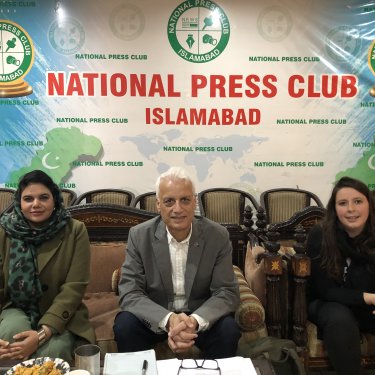Pakistan: RSF and Freedom Network launch a programme to support Afghan journalists in exile

Freedom Network, a partner of Reporters Without Borders (RSF) in Pakistan, has launched the "Advocacy Hub for Afghan Journalists" initiative to support Afghan journalists in exile in that country.
"The "Advocacy Hub for Afghan journalists" project aims to support Afghan journalists who had to flee to Pakistan to save their lives after the Taliban came to power in Afghanistan in 2021. They have had to put an abrupt end to their journalistic careers and are now faced with a very difficult daily life. It is essential to support them and find lasting solutions to give them new prospects, particularly in their professional lives. We would like to thank RSF and the EU-funded ProtectDefenders mechanism for providing the resources and technical support needed to undertake this project.
Freedom Network, RSF's partner in Pakistan, launched on 6 December in the capital Islamabad a pilot initiative lasting several months, entitled "Advocacy Hub for Afghan Journalists", which will benefit nearly 100 Afghan journalists in exile. Led by Iqbal Khattak, Executive Director of Freedom Network, the project is supported by RSF through the ProtectDefenders programme funded by the European Union.
The programme includes lobbying Pakistani policy and decision-makers to ensure the safety of journalists in exile and to enable them to work in their host country, capacity-building workshops for Pakistani media and colleagues, and legal assistance.
Some sixty Afghan journalists in exile participated in the project presentation meeting, attended by an RSF team, at the National Press Club in Islamabad on 6 December. Several professional organisations also took part in this founding event: the Pakistan Federal Union of Journalists (PFUJ), the Rawalpindi-Islamabad Union of Journalists (RIUJ), the Women Journalists Association of Pakistan (WJAP), civil society activists and Pakistani journalists also took part in the launch.
"We live in a climate of tension and anxiety," said Freshta Azizi, a former journalist with the Afghan state broadcaster RTA TV. "We need help to live without this anxiety, which has a very negative impact on the health of each and every one of us." She and her colleagues shared their administrative and financial difficulties. The media professionals also spoke of the slow registration process with the United Nations Refugee Agency (UNHCR). The agency's spokesman, who was present at the meeting, was able to clarify the mechanics of the process.
Around 200 Afghan journalists are currently refugees in Pakistan. Faced with an uncertain future and administrative problems, they have to deal with a lack of resources and police harassment in Pakistan. Since 1 November, they have also been threatened with deportation by the Pakistani authorities, although the statement by interim Prime Minister Anwar Kakar on 17 December suggests that the high risks run by journalists if they are sent back to Afghanistan will be taken into account.
